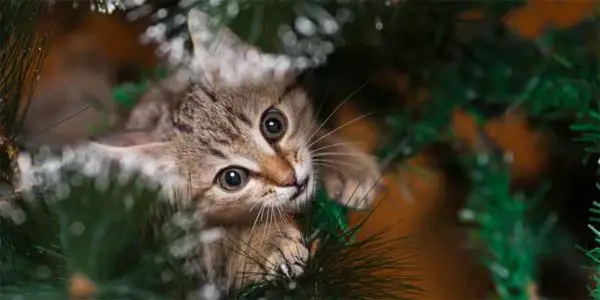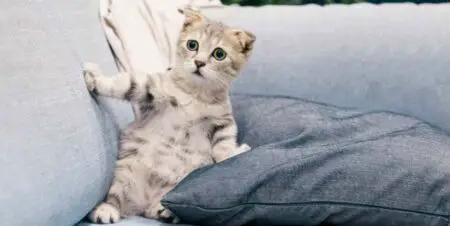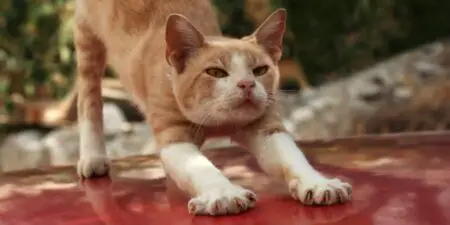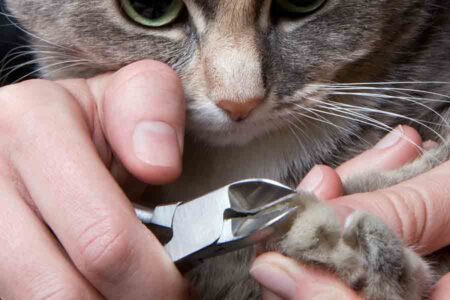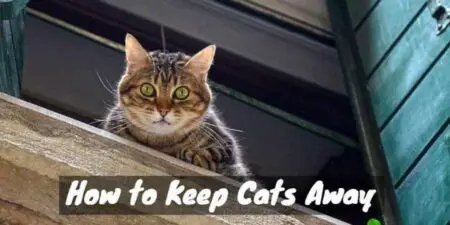Has your lovable, sweet kitty recently developed a concerning habit? Have you caught them chewing on your power cords or charging cables? This new behavior can undoubtedly leave you worried about your electronics and your cat’s safety!
Stopping your cat from chewing on cords is essential, not only for the sake of your devices but also to keep your precious pet safe. With a few simple steps, you can put an end to this problem and restore peace of mind.
[amazon bestseller=”chewing toy for cats”]
Below you’ll find numerous ideas you can implement to solve your cord-eating kitty problem.
Not everything will work with every cat, so you may have to try multiple ideas until you find the perfect solution for you and your cat!
Why Cats Chew on Cords and How to Cat-Proof Wires

Before we discuss how to stop your cat from chewing on cords, it’s important to have a general understanding of some of the possible reasons cats chew on cords in the first place. Having this understanding may help you pinpoint the problem and find the correct solution.
Sometimes cats chose to chew on cords out of boredom. They may just be looking for something fun to play with.
In addition to boredom, the cord chewing you’re seeing could be related to an underlying medical condition such as stress, OCD (obsessive-compulsive disorder), PICA, or even dental issues. If you suspect a medical condition is to blame, talk to your veterinarian in addition to trying some of the solutions below.
1. Hide the Cords
Hiding the cords your cat likes to chew on may seem like a simple solution, but it can also be quite effective. If your cat seems to like cords that are in a particular location in your house, try to hide them behind furniture or another large object if possible.
You could also move the cords to be plugged into a different outlet so you are able to hide them behind a piece of furniture in your home. If your cat cannot get at the cords, they won’t be able to chew them!
2. Avoid Having Long or Loose Cords
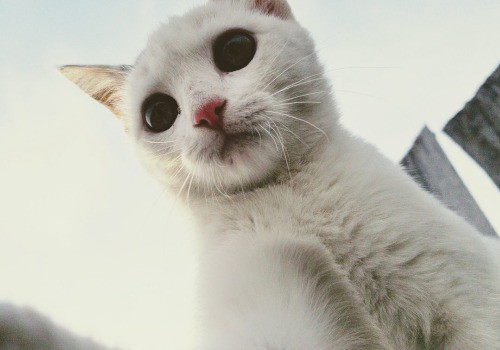
Once you’ve noticed that your cat has started chewing cords, take some time to look closely at the cords they are chewing. Are they longer than necessary? Do you have loose cords hanging off of your desk?
If you have long or loose cords, do what you can to eliminate the extra cord. Wind up your extra cords and use a slip-tie or something similar to keep them together. By eliminating the extra amount of cord, there is less temptation for your cat.
Cats can be especially attracted to a cord that is hanging off a desk. Do what you can to make sure that if it is necessary for the cord to be hanging off the desk that there isn’t a lot of slack that will attract your cat.
3. Cover the Cords With Plastic Wraps
If you are unable to hide the cords behind furniture, another possible solution you can try is to cover the cord. You can buy plastic wraps for cords from most home improvement stores. Once you cover the cords in these wraps, your cat won’t be able to chew on the cord.
[amazon bestseller=”velcro wrap for wires”]
4. Find a Food Your Cat Doesn’t Like and Rub It on the Cord
You can likely find many items in your kitchen that your cat dislikes. You can use these to your advantage by rubbing them on the cord (with it unplugged). Your cat will want to stay away!
Some items in your kitchen that will keep your kitty away from the cords include hot sauce, citrus fruits, and cayenne pepper. You might use these staples to create delicious meals, but your kitty doesn’t find them appealing!
Before you use any food on your cords, check to make sure that it is safe. You don’t want to solve one problem by creating an even more serious one and threatening your cat’s safety!
5. Rub Soap or Menthol on the Cord
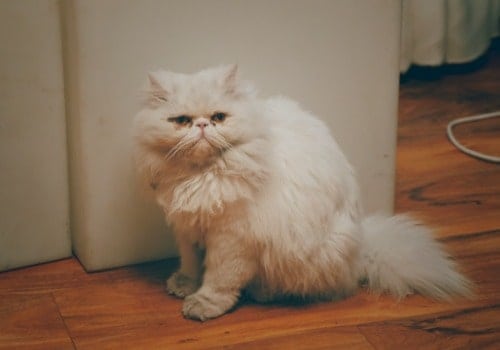
Dish soap and menthol are other smells that will discourage your cat from chewing on your cords. Cats do not like the smell or taste of soap, so if you rub it over the cord (again, with the cord unplugged), your cat will want to stay away! Additionally, cats do not like menthol, so if you use a product like Vick’s Vapor Rub on the cords, they won’t want to nibble them.
6. Use a Bitter Spray Deterrent
If you’d prefer to buy a product you can spray your cords with instead of using household items, you can purchase a bitter apple spray. This can be very effective at stopping cats from chewing on cords because of their strong distaste for them.
However, if you chose to use a bitter spray, you need to be very cautious about how much you use it. Ingesting too much of the spray can be potentially harmful to your cat.
[amazon bestseller=”bitter spray for cats”]
7. Put Tape Around the Cords
Another relatively simple solution you may want to consider is to put double-sided tape around your cords. Your cat will not enjoy the sticky taste of the tape, so it won’t want to chew your cords anymore.
Another type of tape you can use to wrap around the cords is foil tape. When the cat chews on the foil tape, it will get an alkaline taste in its mouth, which it will not enjoy. You can pick up foil tape at a home improvement store near you.
Using tape to cover the cords is a cheap option. A few rolls of tape will probably be all you’ll need to cover all the cords in your home. Beware, though, if you plan to remove the tape at some point in the future, the cords may have a sticky residue on them.
8. Deter Your Cat When You Spot Them Chewing
If you catch your cat in the act of chewing, act immediately to deter them and stop the action! Think about what your cat doesn’t like and use it to your advantage. Take note, though, that you don’t want to use your cat’s name when your cat is doing a non-desirable action; save their name for giving praise.
One way you can deter your cat from chewing when you catch them in the act is to make a loud sound or say something like “no” or “ah.” This will startle them and stop them in their tracks.
Cats are notorious for hating water. Keep a spray bottle handy so when you see your kitty start chewing, you can spray them. Again, this is an unpleasant experience that, if consistently used, can deter your cat from chewing.
If you chose to use either of these methods, consistency is key. These will not be effective if you don’t use them every time you see your cat chewing your cords.
Also, remember, these need to be done immediately. It will not be effective at all (and could cause additional problems) if you come home to a chewed cord and then bring your cat into the room to spray or yell at them.
9. Provide Alternatives for Your Cat
Remember, one of the reasons your cat might be chewing your cords is boredom. If you don’t want them to make your cords their toys, you need to provide them with alternatives.
Take a trip to your local pet store and pick up some new toys for your cat. Since you know they like to chew on cords, try to find some toys with similar shapes or materials.
Cats also love the smell of catnip. So, if the new toys are enticing enough to pull your cat away from your cords, consider rubbing catnip on your toys. Your kitty will be much more likely to want to play with their new toys now!
10. Play With Your Cat More
Again, if you think boredom might be the underlying reason your cat is chewing your cords, take more time to play with your cat! Even if you have a busy schedule, find pockets of time to throw a toy mouse or pull a string for your cat to chase.
Playing with your cat can be very beneficial. It can help decrease their boredom while also increasing their bond with you. Both of these could help them decrease their chewing problem.
[amazon bestseller=”best cat toy”]
11. Incorporate More Digestible Fiber Into Your Cat’s Diet
When cats ingest more digestible fiber, their undesirable chewing is often reduced, or may even stop altogether. There are a few different ways you can offer your cat digestible fiber.
Consider mixing greens, lettuce, or green beans with your cat’s food to up the digestible fiber in their diet. You can also look for cat foods that are labeled as ‘hairball control‘ as these generally include more digestible fibers than traditional cat food.
If you want to learn other ways to incorporate more digestible fiber into your cat’s diet, consult your veterinarian.
12. Reduce Your Cat’s Anxiety
Anxiety in cats is not always as easy to identify as anxiety in humans. Cats often exhibit undesirable behaviors such as chewing, scratching, or urinating when they are anxious.
If you think your cat’s anxiety may be a contributing factor to their cord chewing, check with your veterinarian. They will be able to help you implement strategies that can help reduce your anxiety. And, in some more serious cases, they may prescribe medicines to help calm your kitty down.
[amazon bestseller=”cat anxiety relief”]
Final Thoughts on Cat Cord Chewing
Cord chewing is definitely not something you want your cat to continue to do for a multitude of reasons. Hopefully, some of the ideas you’ve read here will help you find a solution to this problem.
Remember, solutions that work for one cat won’t necessarily work for your cat. You may need to be patient and use trial and error to find the perfect solution for you.
"In ancient times cats were worshipped as gods; they have not forgotten this."
-- Terry Pratchett

